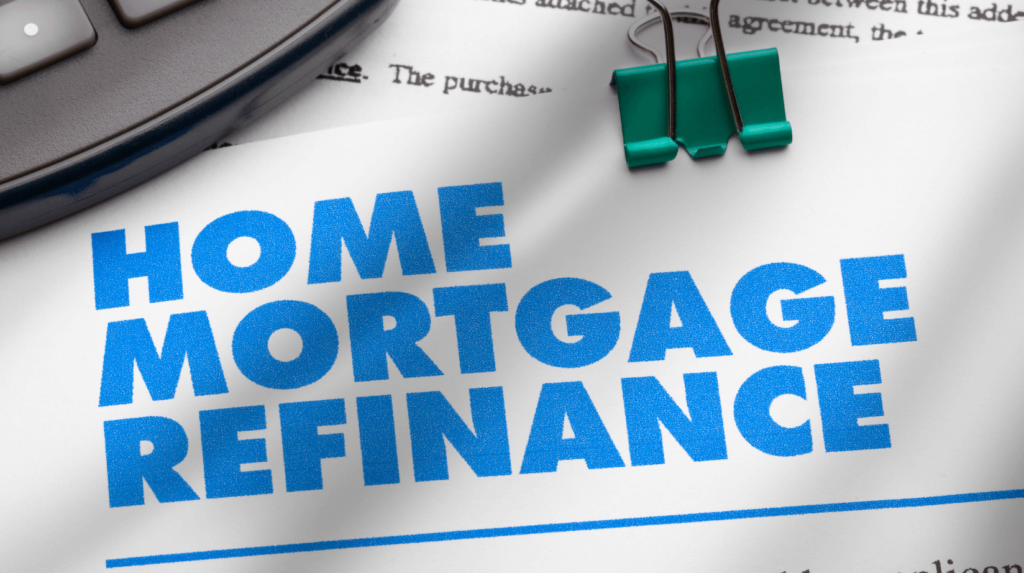How to refinance your home like a pro

Refinancing stands as a potent tool for property investors, offering a pathway to tap into property equity for further investment endeavours. The ability to obtain finance and strategically refinance plays a pivotal role in building a substantial property portfolio. To navigate this process effectively, we’ve created a easy to follow guide on what to do and what not to do when refinancing your home.
Make sure it’s worth your while to refinance
Refinancing can be a strategic move to lower interest rates and secure better terms, but it’s crucial to assess whether the benefits outweigh the associated costs. To make an informed decision, calculate your break-even point, which signifies when the savings from refinancing offset the expenses.
Calculating the break-even point
Formula: Break-even point = Total refinancing costs / Monthly savings on repayments
For instance, if your total refinancing costs amount to $1800 and the new interest rate reduces your monthly mortgage repayment by $150, the break-even point is 12 months (1800/150). This implies that it would take a year of reduced mortgage repayments to recoup the costs of refinancing.
Significance of the break-even point
The break-even point serves as a critical metric in the decision-making process. Beyond this point, you begin to realise tangible savings from refinancing. If you anticipate residing in your home for a period surpassing the break-even duration, refinancing becomes a viable and beneficial option. The subsequent savings can be harnessed throughout the remaining term of your mortgage.
Considerations for decision-making
- Short-Term vs Long-Term Plans: Evaluate your housing plans. If you foresee a short-term stay, the break-even point becomes more crucial, ensuring you experience tangible savings before potential relocation.
- Interest Rate Differential: A substantial reduction in interest rates magnifies the potential savings. If the interest rate difference is significant, the break-even point may occur sooner, making refinancing an attractive prospect.
- Total Mortgage Term: Assess your remaining mortgage term. If you have a considerable time left on your mortgage, the prolonged benefit period after the break-even point enhances the overall advantage of refinancing.
- Future Interest Rate Trends: Consider future interest rate trends. If rates are anticipated to rise, locking in a lower rate through refinancing becomes more advantageous, strengthening the case for this financial move.
Streamline your finances

Consider the potential benefits of refinancing multiple properties to a single lender—a strategy that some lenders incentivise with cashback offers. Beyond the allure of cash incentives, consolidating your loans with one lender can result in substantial cost savings, including lower interest rates and reduced fees. This approach also simplifies the management of multiple loans, providing a streamlined and convenient process.
However, this option requires careful consideration of both costs and benefits. A thorough comparison of refinancing each property individually versus bundling them as a package is crucial to determining the most suitable approach aligned with your financial goals.
It’s important to note that refinancing multiple properties to a single lender may introduce complexities in the application process. Additional documentation and verification of income, assets, and liabilities might be required. To navigate this intricacy and make informed decisions, it is highly advisable to enlist the expertise of a knowledgeable broker or financial adviser. Their guidance can ensure you navigate the process seamlessly and make the best decisions for your financial well-being.
Be strategic and think ahead when choosing between fixed and variable rates

Choosing a long-term fixed-rate loan demands careful consideration, as it may not always align with your best interests. Personal circumstances and market conditions play pivotal roles in making an informed decision. Consider the following when deciding on a variable or fixed rate home loan.
When to exercise caution:
1. High existing interest rates:
- Risk of Higher Rates: If current interest rates are elevated, opting for a long-term fixed-rate loan might lead to paying a higher rate than the prevailing variable-rate option.
- Market Monitoring: Regularly monitor market conditions to identify the optimal time for fixed-rate commitments.
2. Near-term property sale plans:
- Potential Exit Costs: Planning to sell your property in the near future? Exiting a fixed-rate loan early may incur break costs or exit fees.
- Evaluate Future Intentions: Align the fixed term with your anticipated property ownership duration.
3. Desire for special loan features:
- Limited Flexibility: Long-term fixed-rate loans often lack additional features like offset accounts or redraw facilities.
- Assess Flexibility Needs: If you require loan flexibility or specific features, a fixed-rate option may not be the ideal fit.
Strategic considerations:
1. Favourable market conditions:
- Timing is Crucial: Opt for a long-term fixed-rate loan when market conditions indicate favourable rates for an extended period.
- Interest Rate Projections: Analyze interest rate projections to gauge potential fluctuations.
2. Long-term property holding plans:
- Alignment with Ownership Goals: If your intention is long-term property ownership, a fixed-rate loan may provide stability and predictable repayments.
- Evaluate Financial Commitment: Assess your financial capacity to commit to fixed repayments over an extended duration.
3. Risk mitigation strategies:
- Diversification of Loan Portfolio: Consider diversifying your loan portfolio with a mix of fixed and variable rates to balance risks.
- Professional Guidance: Seek advice from financial experts to formulate risk mitigation strategies based on your financial goals.
4. Flexibility for changing circumstances:
- Anticipate Future Needs: Anticipate potential changes in personal or financial circumstances and choose a loan structure that accommodates future needs.
- Review Loan Terms: Regularly review loan terms to ensure they align with evolving life circumstances.
Anticipate future rate increases

In light of anticipated interest rate hikes, it is crucial to stay informed about economic forecasts and the prevailing cash rate situation, as dictated by the Reserve Bank of Australia (RBA). The RBA’s decisions on adjusting the cash rate, whether upward, downward, or maintaining the status quo, are contingent on the overall economic conditions.
Stay attuned to the factors influencing the RBA’s monetary policy. While expert advice is valuable, it’s essential to align decisions with your unique financial circumstances and exercise prudence.
To mitigate the risk posed by potential interest rate changes, consider options like fixing your rate or opting for a variable-rate loan with a rate lock feature, allowing you to secure the rate for a specified duration.
Leverage our interest rate rise calculator to estimate the potential impact of rate hikes on your repayments.
Proactive measures to manage the risk of rising interest rates can help minimise the impact on your mortgage repayments, ensuring continued financial stability over the long term.
A clean history and timely repayments is a great asset

During the refinancing process, most lenders scrutinise your credit history, and a less-than-stellar credit record can hinder approval for a new loan or favourable interest rates.
To preserve a clean credit history, prioritise timely bill payments. Avoid overextending your credit and refrain from submitting numerous credit applications. Regularly monitoring your credit report is crucial for identifying errors or fraudulent activities that might negatively impact your credit score.
Lenders go beyond credit history, evaluating factors like income, expenses, employment history, and property value when assessing loan terms. Maintaining a stable income and a healthy debt-to-income ratio can positively influence your eligibility for a competitive loan and enhance your borrowing capacity.
Understanding lending criteria:
- Credit History Assessment:
- Integral Component: Most lenders scrutinise your credit history during the refinance process.
- Impact on Approval: A poor credit history can hinder loan approval and result in less favourable interest rates.
- Holistic Evaluation:
- Beyond Credit History: Lenders consider various factors, including income, expenses, employment history, and property value, to determine your overall financial standing.
- Comprehensive Analysis: A holistic evaluation helps lenders gauge the risk associated with offering a refinancing deal.
Maintaining a clean credit history:
- Timely Bill Payments:
- Payment Discipline: Ensure bills are paid on time to demonstrate financial responsibility.
- Credit Score Impact: Timely payments positively impact your credit score, enhancing your eligibility for favourable loan terms.
- Avoid Overextending Credit:
- Prudent Credit Usage: Refrain from overextending credit limits to maintain a healthy credit utilisation ratio.
- Cautious Applications: Limit credit applications to avoid signalling financial instability to lenders.
- Regular Credit Report Reviews:
- Error Identification: Regularly review your credit report to identify any errors or fraudulent activities.
- Score Maintenance: Promptly addressing discrepancies helps maintain an accurate credit score.
Enhancing loan eligibility:
- Stable Income:
- Income Consistency: Maintain a stable income, showcasing financial reliability to lenders.
- Debt-to-Income Ratio: A healthy debt-to-income ratio positively impacts loan eligibility and borrowing capacity.
- Employment History:
- Consistent Employment: Lenders favour applicants with a stable employment history.
- Long-Term Stability: Demonstrating consistent employment enhances your overall financial profile.
Proactive measures for approval:
- Credit Counseling:
- Professional Guidance: Seek credit counselling if needed to address financial challenges.
- Expert Advice: Credit counsellors provide strategies to improve your financial standing and creditworthiness.
- Timely Communication with Lenders:
- Open Dialogue: Maintain open communication with lenders, especially if facing financial difficulties.
- Negotiation Opportunities: Some lenders may offer solutions or modifications based on transparent communication.
- Financial Health Check:
- Regular Assessments: Conduct periodic assessments of your financial health.
- Adjustment Strategies: Proactively adjust financial strategies based on changing circumstances.
Plan your repayments for long term success

When contemplating refinancing, the choice between a shorter loan term with higher repayments or a longer term with additional repayments requires careful consideration.
Exploring a shorter loan term, even if it entails higher interest rates, can be a prudent financial choice. Opting for a shorter term results in reduced interest payments over the loan’s lifespan. Alternatively, you may choose a longer loan term but commit to making additional repayments. This strategy not only accelerates loan repayment but also leads to substantial interest savings. Making payments beyond the minimum requirement facilitates faster equity building in your home. If this option appeals to you, ensure that your refinancing involves a loan that allows extra repayments without incurring penalties.
Get an Offset Account
Opt for an offset account to save on interest payments. An offset account allows you to pay bills and living expenses using a credit card while keeping funds in the offset account. This strategy minimises interest payments, effectively letting your credit card company contribute to interest payment reduction. It serves as an effective money management tactic.
Speak to an Expert ( We can help)
Seek guidance from a trusted mortgage broker or lending expert with a good track record. The market is flooded with lenders and diverse home loan products. An expert home loan strategist can align your unique situation with the most suitable product. With factors like debt-to-income ratios and serviceability buffers affecting property investment, a mortgage broker helps plan a lending strategy that aligns with your long-term goals.
Things you should avoid when refinancing:

Chasing Deals
Don’t succumb to the knee-jerk temptation of chasing short-term incentives, like low-interest rate deals or bonuses. Many of these deals come with reversion to standard interest rates or hidden fees upon loan exit. Prioritise loans that align with your long-term investment goals. Consulting with your home loan expert ensures you make choices that contribute to sustained success.
Unnecessarily Fix Your Interest Rate
Avoid blindly fixing your interest rate, assuming rates will only rise. Fixed-rate loans may carry higher interest rates than variable-rate loans, and banks often anticipate market moves in their pricing. If considering a fixed rate, consult with your lending expert to determine the most suitable approach for your circumstances. Be wary of substantial exit fees associated with fixed-rate loans, limiting flexibility compared to variable-rate options.
Going Straight to a Lender
Don’t directly approach a lender without strategic planning. Each loan application impacts your credit rating. Mortgage brokers play a crucial role by assessing your odds of success before formal application, protecting your credit rating. Preserving a positive credit rating is vital for securing future finance and expanding your property portfolio.
In essence, refinancing is a dynamic tool for property investors, but its effectiveness lies in strategic decision-making. By adhering to these do’s and don’ts, investors can navigate the refinancing landscape with confidence, contributing to the long-term success of their property ventures.
Don’t let the prospect of refinancing overwhelm you. In today’s tech-driven landscape, the process is more accessible than ever. Our seasoned team at Rateseeker is here to guide you through the entire refinancing journey.
Benefit from our wealth of experience as we work closely with you to understand your unique needs and financial objectives. Whether you seek lower interest rates, improved loan terms, or accessing equity for further investments, we’ve got you covered.
Reach out to us at Rateseeker today for personalised guidance and expert advice on refinancing options crafted specifically for your situation. Your financial goals are unique, and our team is dedicated to helping you achieve them through a seamless and efficient refinancing process.
** General Advice Warning
The information provided on this website is general in nature only and it does not take into account your personal needs or circumstances into consideration. Before acting on any advice, you should consider whether the information is appropriate to your needs and where appropriate, seek professional advice in relation to legal, financial, taxation, mortgage or other advice.




